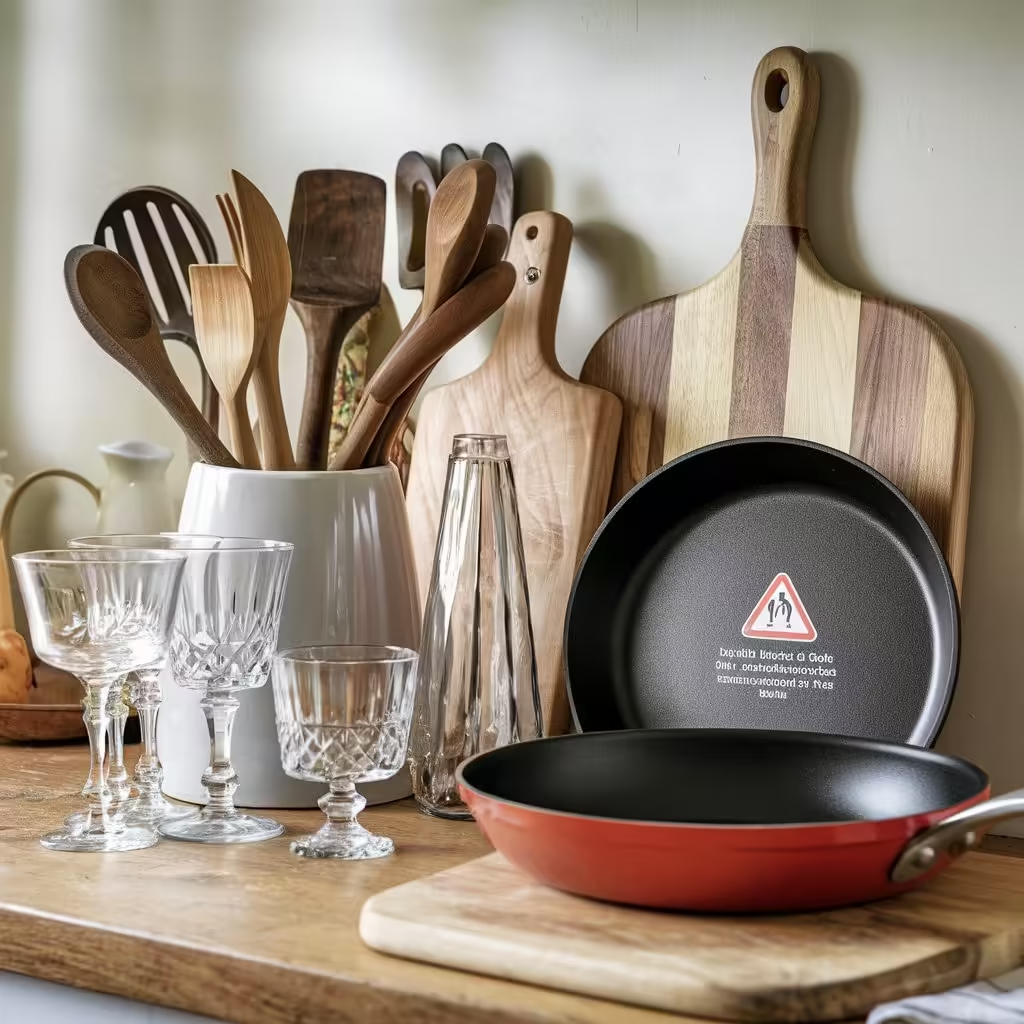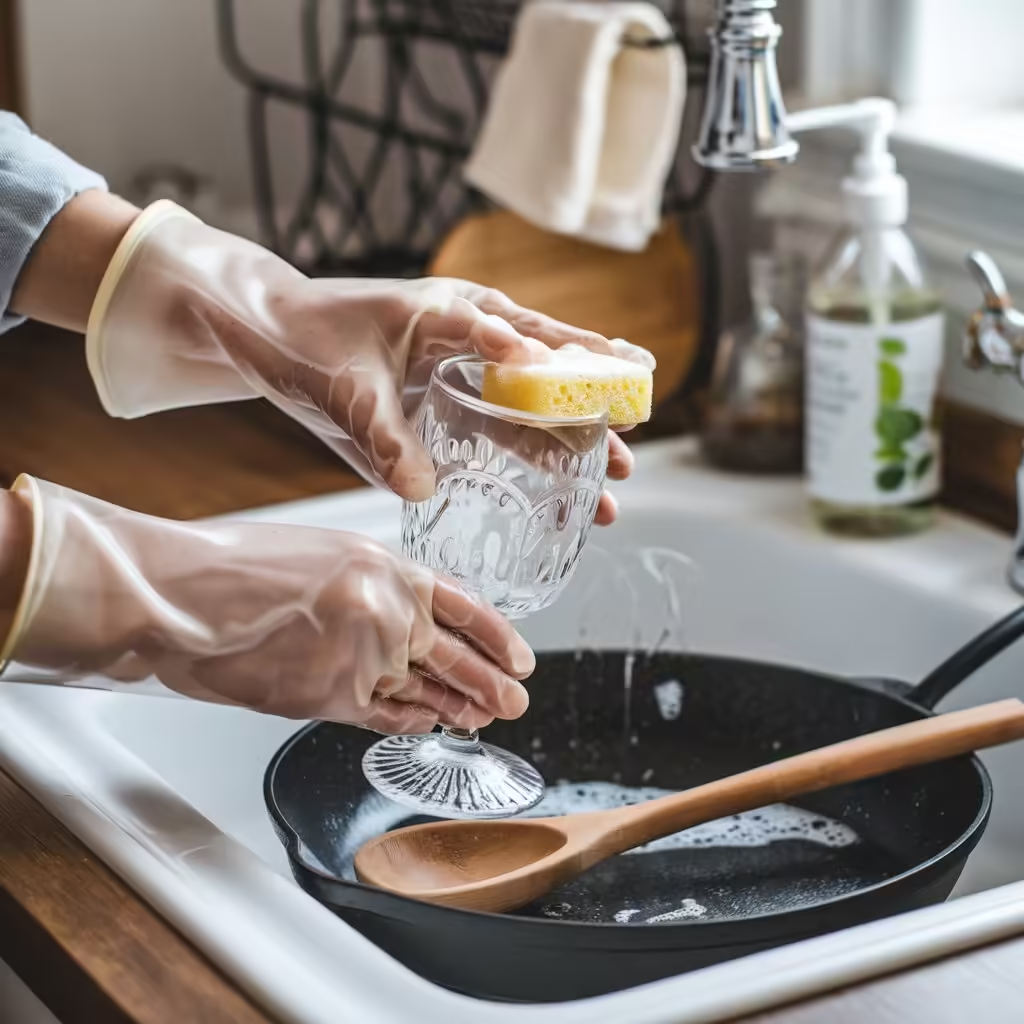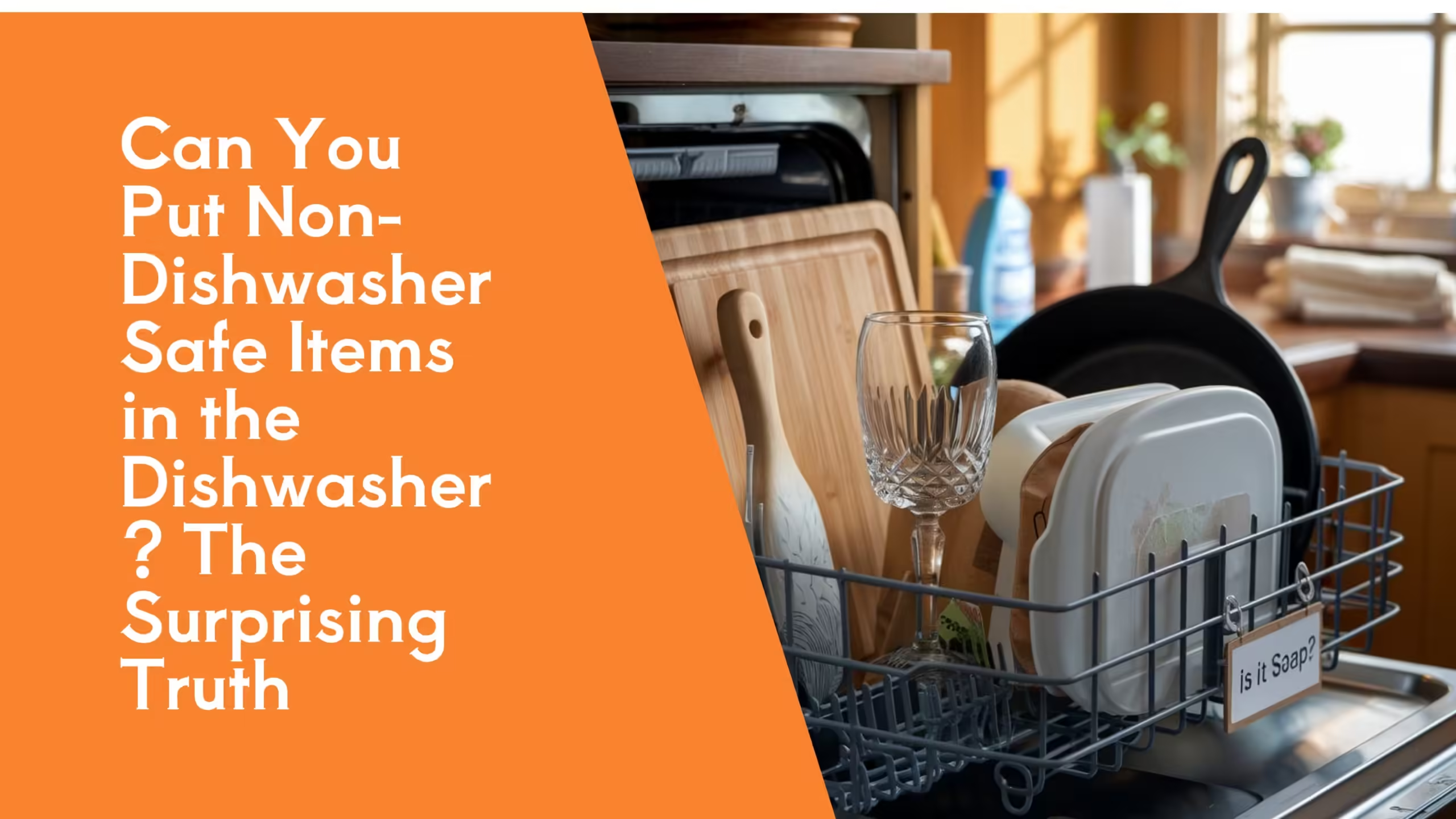We’ve all been there – staring at a pile of dishes, a non-dishwasher safe item in hand, and thinking, “What’s the worst that could happen?”
Can you put non-dishwasher safe items in the dishwasher?
It’s time to separate fact from fiction and learn the surprising truth about what happens when you ignore those “hand wash only” labels.
What Are Non-Dishwasher Safe Items?

Non-dishwasher safe items are typically made from materials that can’t withstand the heat, pressure, or harsh detergents used in dishwashers.
These items often have special coatings, delicate decorations, or properties that make them vulnerable to damage in the dishwasher’s intense environment.
Some of these everyday non-dishwasher safe items include:
Wooden utensils and cutting boards.
Cast iron cookware.
Delicate glassware and crystal.
Non-stick pans with special coatings
Just because an item is sturdy doesn’t mean it’s dishwasher-friendly.
The Dangers of Ignoring Dishwasher Safety Labels
Before you throw caution to the wind, this is why those little labels matter more than you might think.
Item Damage: Non-dishwasher safe items can warp, melt, or discolor faster.
Cross-Contamination: When non-safe items break down in the dishwasher, they can leave behind debris and chemicals. When next you use the dishwasher, your sparkling clean plates will mingle with these bits and chemicals.
Dishwasher Damage: Bits of broken glass, melted plastic, or loose debris can clog filters and damage the spray arms.
Common Non-Dishwasher Safe Items You Might Be Tempted to Wash
Some items in your kitchen just aren’t cut out for your trusty kitchen appliance’s high-pressure, high-heat environment.
Here are some of them.
Cast Iron Cookware
Cast iron pans are kitchen workhorses, but they require special care.
The dishwasher can strip away years of carefully built-up seasoning.
Instead of washing them in the dishwasher, do the following.
Rinse with hot water immediately after use
Use a stiff brush to remove food particles
Dry thoroughly and apply a thin layer of oil
Wooden Utensils and Cutting Boards
Wood and water don’t mix well, especially in a dishwasher.
The heat and moisture can cause
Warping
Cracking
Splitting
To care for your wooden kitchenware
Wash by hand with mild dish soap
Rinse thoroughly and dry immediately
Occasionally treat with food-grade mineral oil
Some Plastic Utensils
Not all plastics are created equal. While many are dishwasher-safe, others can
Warp or melt in high heat
Leach chemicals into your food
Absorb odors and stains
Check the bottom of plastic containers for dishwasher-safe symbols. When in doubt, hand wash to be safe.
Delicate Glassware and Crystal
Your precious crystal and delicate wine glasses deserve special treatment.
The dishwasher can be harsh, leading to
Etching or clouding of the glass
Chipping or breakage
Loosening of stems
To keep the items safe,
Wash by hand in warm, soapy water
Rinse in clean water
Dry with a lint-free cloth
Non-Stick Pans
The convenience of non-stick cookware is undeniable, but the dishwasher can be its worst enemy.
Harsh detergents and high heat can
Degrade the non-stick coating
Reduce the pan’s lifespan
Potentially release harmful chemicals
To maintain your non-stick pans
Wash by hand with a soft sponge and mild detergent
Avoid abrasive scrubbers
Dry immediately and store carefully to prevent scratches
Alternatives to Dishwashing for Non-Safe Items

Hand washing is your best bet when it comes to non-dishwasher safe items. It doesn’t have to be a chore to handwash these items.
Here are some practical alternatives I have used to keep my delicate kitchenware in shape over the years.
Mastering Proper Hand-Washing Techniques for Delicate Items
Handling delicate glassware and crystal requires a gentle touch.
Start by lining your sink with a soft towel to prevent accidental chips or breaks.
Use lukewarm water and a mild dish soap to create a sudsy solution.
Gently clean each item with a soft sponge or cloth, paying extra attention to intricate designs or patterns.
Rinse thoroughly with clean water and dry immediately with a lint-free towel to prevent water spots.
For wooden utensils and cutting boards, avoid soaking them in water.
Instead, wash them quickly with hot water and mild soap, then dry them immediately to prevent warping.
Occasionally, treat them with food-grade mineral oil to maintain their condition.
Time-Saving Tips for Efficient Manual Cleaning
Nobody wants to spend hours at the sink, so here are some tricks I use to speed up my hand washing.
Soak tough stains: For baked-on food, let items soak in warm, soapy water while you tackle other dishes.
Use a cleaning caddy: Keep all your dish cleaning supplies in one portable container to save time searching for what you need.
Clean as you go: Wash items immediately after use to prevent food from drying and sticking.
Two-bowl method: To streamline the process, use one bowl for washing and one for rinsing.
Eco-Friendly Solutions for Hand Washing
Going green in the kitchen is easier than you might think! Try these eco-friendly dish-cleaning alternatives.
Make your dish soap using castile soap, water, and essential oils.
Use a biodegradable dish brush made from bamboo or other sustainable materials.
Opt for reusable cloth towels instead of paper towels for drying.
Try soap nuts as a natural, chemical-free cleaning agent.
Tools and Products Good for Gentle Cleaning
Invest in the right tools to make hand washing a breeze
Silicone scrubbers: Gentle on delicate surfaces but effective at removing grime.
Microfiber cloths: Perfect for streak-free drying of glassware and crystal.
Bottle brushes: Ideal for cleaning hard-to-reach areas in vases or water bottles.
Specialized cleaners: Look for products designed specifically for copper or cast iron.
These alternatives might take a bit more time than tossing everything in the dishwasher, but they’ll help preserve your cherished kitchenware for years.
Still Confused? How to Tell If Your Dishes Can Go in the Dishwasher
Determining dishwasher safety can feel like decoding a secret language.
This section will help you make the right decision.
Common Dishware Symbols and Labels
Check those tiny symbols on your dishes. They’re crucial kitchenware labels that can save you from a dishwashing disaster.
Here’s a quick rundown:
A wine glass or dish with water droplets: This means your item is dishwasher safe. Go ahead and load it up!
A crossed-out wine glass or dish: Hand wash only. Keep this one out of the machine.
A square with diagonal lines or waves: This indicates the item is safe for the top rack only.
Hand-wash only symbol: This usually shows a hand washing a dish in a water bowl.
DIY Dishwasher Safety: Quick Tests for Questionable Items
No symbol? No problem! I’ve seen many kitchenwares without a warning sign. Here are some quick tests to assess an item’s dishwasher safety.
The material test: Generally, items made of ceramic, glass, and stainless steel are dishwasher safe. Plastic is trickier – look for a “dishwasher safe” label.
The temperature test: If an item warps or changes shape in hot water, it’s probably not dishwasher safe.
The finish test: Items with special finishes or decorations might not survive the dishwasher. When in doubt, hand wash.
General Rules of Thumb for Questionable Items
When you’re still unsure, follow these golden rules
If it’s valuable or irreplaceable, wash it by hand. Better safe than sorry!
Wooden items, cast iron, and non-stick pans are usually hand-washed only.
Delicate glassware and crystal should stay out of the dishwasher.
Aluminum might discolor in the dishwasher, so it’s best washed by hand.
Conclusion
So, can you put non-dishwasher safe items in the dishwasher? The short answer is: it’s a gamble you probably don’t want to take!
While tossing everything in for a quick clean might be tempting, the risks often outweigh the convenience.
Your dishwasher is a powerful tool, but it’s not a one-size-fits-all solution.
Following these guidelines, you can keep your dishes and dishwasher in excellent condition.
Now, it’s time to tackle that dirty pile of dishes. Happy cleaning.

Alessandra Scot specializes in demystifying dishwasher technologies and trends. With her extensive retail background, Ale offers insightful reviews and guides, helping you make informed decisions for your home appliance needs.





